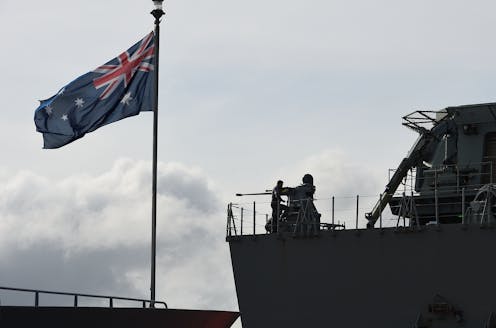Is Australia in danger of becoming the US's 'deputy sheriff' in the South China Sea?
- Written by The Conversation

Recent comments by Defence Minister Richard Marles about Australia, China and the international law of the sea raise the spectre of Australia acting as an Indo-Pacific “deputy sheriff” for the United States, enforcing the rules-based international order.
According to Marles, China’s live-fire military operations encircling Taiwan have breached the UN Law of the Sea, which requires countries to ensure peace and security in international waters. Marles called on China to cease its operations around Taiwan and asserted that Australia will continue its own peaceful military operations in the region.
Read more: Explainer: why is the South China Sea such a hotly contested region?
Marles was responding to Taiwan Strait tensions following the recent visit of US Speaker of the House Nancy Pelosi and resulting Chinese military exercises in and around Taiwan including the launching of ballistic missiles. Australia’s military chiefs have also implied Australia will not go backwards in its South China Sea operations and will continue surveillance and other activities.
China increasingly asserts itself in the region
Throughout the year, China has taken an increasingly robust approach towards American, Australian, and Canadian military activities in the South China and East China Seas.
In May a RAAF P-8A Poseidon maritime surveillance aircraft was challenged by Chinese military aircraft near the Chinese claimed Paracel Islands. In July, HMAS Parramatta was subject to surveillance and monitoring by a number of Chinese aircraft and naval vessels, including a nuclear submarine, while passing through the South China and East China Seas.
In both instances, the official Chinese position has been that the Australian ships and aircraft were unnecessarily and illegally intruding into Chinese waters and airspace. China justifies its actions as seeking to expel a foreign military force from an area over which it exercises sovereignty.
Australia’s response is that it is acting consistently with the international law of the sea. Its position has been that its ships are exercising freedom of navigation and its aircraft the freedom of overflight.
Read more: Conflict in the South China Sea threatens 90% of Australia's fuel imports: study
Actions exacerbate growing tensions
Each of these encounters occurs within a wider geopolitical and legal space which the recent tensions over Taiwan have further sharpened. They align with three distinct types of recent actions.
First, China has increasingly taken a much more assertive position throughout the region with respect to its territorial claims to both the South China Sea islands and Taiwan.
Second, China is seeking to exercise sovereign control over the waters and much of the airspace in the South China Sea.
Finally, China wishes to expel all foreign militaries from the region, especially the United States.
The United States has for 50 years conducted freedom of navigation operations (FONOPS) around the world to ensure the freedom of navigation for American merchant ships and warships. US FONOPs originally challenged sweeping Cold War claims by the former Soviet Union and evolved to challenge excessive maritime claims, or claims inconsistent with international law, by any country.
FONOPs in Asia-Pacific
These FONOPs are a Congressionally-approved and fully transparent military operation designed to advance a number of US national security interests.
There is a large number of ships assigned to FONOPs as part of the Seventh Fleet, the largest of the US Navy’s forward-deployed fleets, based in Japan. There are 50-70 ships and submarines, 150 aircraft, and more than 27,000 sailors and marines regularly deployed to the Seventh Fleet.
Read more: Despite strong words, the US has few options left to reverse China's gains in the South China Sea
Recently, FONOPs have begun to focus on the South China Sea, sending multiple assets to respond to China’s actions. In July, an encounter between the USS Benfold_= and the Chinese military was soon followed by the US deploying an aircraft carrier, the USS Ronald Reagan, with accompanying support ships and aircraft. Australia does not have that level of back up and support, let alone an aircraft carrier.
Australia’s position
The official Australian position is that it does not conduct US-style FONOPs. Australia has consistently claimed under both Coalition and Labor governments that it seeks to assert the freedom of navigation and strongly supports the 1982 United Nations Convention on the Law of the Sea.
The Albanese government has stated Australia’s formal position has not changed and any South China Sea operations – whether at sea or in the air – are routine.
The Royal Australian Navy (RAN) says its operations are often associated with port visits within the region to Vietnam, Korea, or Japan. The Royal Australian Air Force (RAAF) notes they are undertaking regular surveillance operations throughout the region in cooperation with regional partners.
Future Australian operations?
Port visits and surveillance operations are all legitimate grounds for the Australian military to be operating in the South China Sea. However, it is the pattern of conduct and the support that Australia is showing for the Americans that needs more attention.
That Defence Minister Marles is standing by his 2016 comments proposing Australia conduct its own FONOPs, including within 12 nautical miles of the artificial islands China has built, may indicate further Australian military operations in the region.
Already, the 2022 maritime patrols and interactions with the Chinese military give the appearance Australia is acting as an American “deputy sheriff” enforcing the rules-based order of the law of the sea. If this is what the Australian government intends, there needs to be more transparency about Australia’s ultimate regional goals and objectives, the consequences of these tactics towards the bilateral relationship with China, and the back-up Australia can expect from the Americans if miscalculations arise and incidents occur during encounters with the Chinese military.







